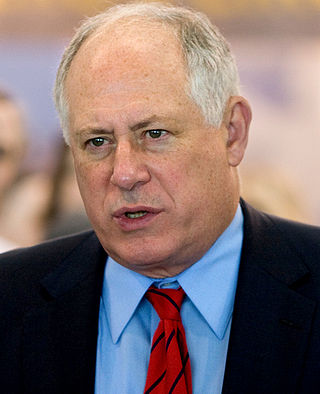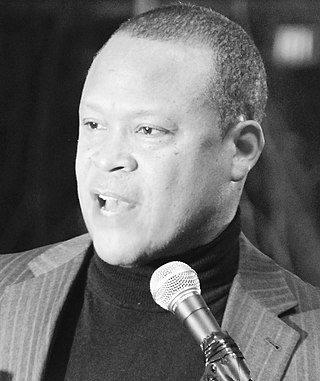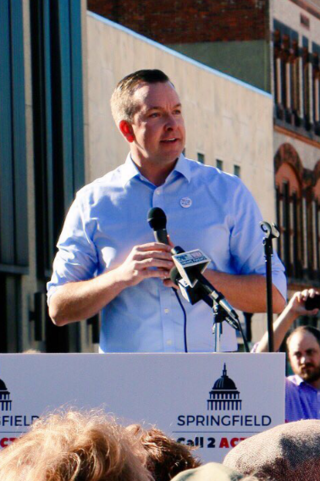Related Research Articles

Michael Joseph Madigan is an American politician who is the former speaker of the Illinois House of Representatives. He was the longest-serving leader of any state or federal legislative body in the history of the United States, having held the position for all but two years from 1983 to 2021. He served in the Illinois House from 1971 to 2021. He represented the 27th District from 1971 to 1983, the 30th district from 1983 to 1993, and the 22nd district from 1993 to 2021. This made him the body's longest-serving member and the last legislator elected before the Cutback Amendment.

Patrick Joseph Quinn Jr. is an American politician who served as the 41st governor of Illinois from 2009 to 2015. A Democrat, Quinn began his career as an activist by founding the Coalition for Political Honesty. He was elected lieutenant governor in 2002 and served under governor Rod Blagojevich. After Blagojevich was impeached and removed from office in 2009, Quinn assumed the governorship. He secured a full term in office in the 2010 gubernatorial election, but later lost his bid for a second term in the 2014 gubernatorial election to his opponent Bruce Rauner.

Kenneth Dunkin is an American politician. Dunkin previously served as a Democratic member of the Illinois House of Representatives, representing the 5th District from December 2002 until January 2017 and as an appointed by Governor Bruce Rauner to fill a vacancy on the Board of Commissioners for the Metropolitan Water Reclamation District of Greater Chicago in May 2018, serving until December of that same year.

William E. Brady is an American politician who was a Republican member of the Illinois Senate from May 2002 until his resignation in December 2020.
William Quincy Davis is a Democratic member of the Illinois House of Representatives, representing the 30th District since January 8, 2003. He is a member of the Illinois House Legislative Black Caucus.
The Paul Simon Public Policy Institute is located at Southern Illinois University Carbondale. It was founded by Paul Simon, a former two-term U.S. Senator from Illinois and one-time candidate for the Democratic Party nomination for President of the United States. Opening in 1997, the Institute differentiates itself from similar organizations by working directly with elected officials and others to fashion and implement change in public policy.
Jack Darrow Franks is an Illinois attorney and politician who served as Chairman of the McHenry County Board from December 2016 to December 2020. Previously, Franks served as a member of the Illinois House of Representatives, representing the 63rd district from 1999 to 2017. His McHenry area district included all or parts of Harvard, Marengo, Woodstock, Bull Valley, Wonder Lake, Illinois, Greenwood, McHenry, Fox Lake, Spring Grove, Johnsburg and Lakemoor.

Heather Adeline Steans is a former Democratic member of the Illinois Senate, representing the 7th district. She was appointed after winning a special primary election that followed the mid-term resignation of her predecessor, Senator Carol Ronen. She resigned from office on January 19, 2021 after 12 years in office.

Illinois is seen as one of the most progressive states in the United States in regard to lesbian, gay, bisexual, and transgender (LGBT) rights and often viewed as one of the most liberal states in the Midwestern United States. Same-sex sexual activity has been legal since 1962, after Illinois became the first U.S. state to repeal its sodomy laws. Same-sex marriage was banned by statute in 1996, but has since been legalized after a law allowing such marriages was signed by Governor Pat Quinn on November 20, 2013 and went into effect on June 1, 2014. Civil unions have been recognized since 2011, and same-sex couples are also allowed to adopt. Additionally, discrimination on the basis of sexual orientation and gender identity is banned in employment, housing, credit and public accommodations, and conversion therapy on minors has been outlawed since 2016.
The 1996 United States federal budget is the United States federal budget to fund government operations for the fiscal year 1996, which was October 1995 – September 1996. This budget was the first to be submitted after the Republican Revolution in the 1994 midterm elections. Disagreements between Democratic President Bill Clinton and Republicans led by Speaker of the House Newt Gingrich resulted in the United States federal government shutdown of 1995 and 1996.

The 2014 Illinois gubernatorial election was held on November 4, 2014, to elect the Governor and Lieutenant Governor of Illinois, concurrently with the election to Illinois's Class II U.S. Senate seat, as well as other elections to the United States Senate in other states and elections to the United States House of Representatives and various state and local elections.

Christian Mitchell is the incoming Vice President for Civic Engagement at the University of Chicago. He currently serves as Deputy Governor for Illinois Governor J.B. Pritzker’s administration. Prior to assuming that role, Mitchell represented the 26th District of Illinois as state representative from 2013 to 2019. He also served as the executive director of the Democratic Party of Illinois during the 2018 election cycle, becoming the first African-American to hold the position.

Andy Manar is a former Democratic member of the Illinois Senate. He represented the 48th district, including part or all of Christian, Macon, Macoupin, Madison, Montgomery, and Sangamon counties. Andy Manar is known for being the chief advocate for SB 1947, which made dramatic reforms to Illinois’ education funding formula. Prior to his service in the Illinois Senate, he was chairman of the Macoupin County Board from 2003 to 2012.

Michael E. Hastings is a Democratic member of the Illinois Senate from the 19th Legislative District. The district includes all or parts of Lockport, New Lenox, Mokena, Orland Park, Tinley Park, Frankfort, Frankfort Square, Homer Glen, Joliet, Richton Park, Matteson, Olympia Fields, Country Club Hills, Hazel Crest, and Oak Forest.

Bruce Vincent Rauner is an American businessman, philanthropist, and politician who served as the 42nd governor of Illinois from 2015 to 2019. A member of the Republican Party, he previously served as the chairman of R8 Capital Partners and chairman of the Chicago-based private equity firm GTCR.

The Sixty-eighth Colorado General Assembly was the meeting of the legislative branch of the State of Colorado, from January 12, 2011 until January 9, 2013. In the 2010 midterm elections, the Republican Party won a slim majority in the Colorado House of Representatives, while the Democratic Party kept their majority in the Colorado Senate.

The Ninetieth Minnesota State Senate v. Dayton,, was a 2017 Minnesota Supreme Court case where the Court ruled that Governor Mark Dayton's line item vetoes of appropriations for the Minnesota Senate and Minnesota House of Representatives were a lawful exercise of his authority granted by the Minnesota Constitution. The Court also ruled that since the state legislature had access to other funding to continue operating as a fully functioning and independent branch of government, the governor's vetoes did not effectively abolish the legislature and thereby violate Article III of the state constitution. The Court also ruled that the judicial branch did not have the constitutional authority to order funding without a corresponding budgetary appropriation. The Supreme Court's ruling overturned an earlier ruling by a Ramsey County District Court judge. The case marked the first time in which the Minnesota Supreme Court was asked to resolve a lawsuit brought by one branch of government against another.
The Illinois pension crisis refers to the rising gap between the pension benefits owed to eligible state employees and the amount of funding set aside by the state to make these future pension payments. As of 2020, the size of Illinois' pension obligation is $237B, but the state's pension funds have only $96B available for payouts to retirees.

The 100th Illinois General Assembly, consisting of the Illinois House and Illinois Senate, convened on January 11, 2017. It adjourned sine die on January 9, 2019.
References
- ↑ "Illinois Constitution - Article VIII". Ilga.gov. Retrieved 2017-03-01.
- ↑ Kevin P. Craver. "McHenry County lawmakers sound off on Illinois budget impasse | Northwest Herald". Nwherald.com. Retrieved 2017-03-01.
- ↑ "The Illinois Turnaround" (PDF). Illinois.gov. Retrieved 2017-03-01.
- ↑ "Madigan Raises Heat on Rauner Turnaround Agenda | The Illinois ObserverThe Illinois Observer". Illinoisobserver.net. 2015-05-04. Retrieved 2017-03-01.
- ↑ "Full text: Illinois Gov. Bruce Rauner's budget address - Government News - Crain's Chicago Business". Chicagobusiness.com. 2015-02-18. Retrieved 2017-03-01.
- ↑ "Illinois House Speaker Madigan interview, 5-31-2015". YouTube . Retrieved 2017-03-01.
- ↑ "Gov. Bruce Rauner Vetoes Budget Bills | Chicago Tonight | WTTW". Chicagotonight.wttw.com. 2015-06-25. Retrieved 2017-03-01.
- ↑ "Illinois General Assembly - Bill Status for SB2042". Ilga.gov. Retrieved 2017-03-01.
- ↑ "Illinois General Assembly - Bill Status for HB3763". Ilga.gov. Retrieved 2017-03-01.
- ↑ Pierog, Karen (2015-09-18). "Courts call the shots for budget-less Illinois". Reuters. Retrieved 2017-03-01.
- ↑ "Illinois State Budget : Fiscal Year 2017" (PDF). Illinois.gov. Retrieved 2017-03-01.
- ↑ "99th General Assembly: State of Illinois 2015 and 2016" (PDF). Ilga.gov. Retrieved 2017-03-01.
- ↑ "Illinois General Assembly - Full Text of Public Act 099-0524". Ilga.gov. 2016-06-30. Retrieved 2017-03-01.
- ↑ "Rauner signs stopgap budget, school funding bill — but relief from stalemate proves temporary". Chicago Tribune . Retrieved 2017-03-01.
- ↑ Posted 11:54 AM, October 12, 2016, by Jordan Muck (2016-10-12). "Rauner denounces Trump as new ad tries to link Governor to his controversial comments". WGN-TV. Retrieved 2017-03-01.
{{cite web}}: CS1 maint: multiple names: authors list (link) CS1 maint: numeric names: authors list (link) - ↑ "Illinois State Budget: Fiscal Year 2018" (PDF). Illinois.gov. Retrieved 2017-03-01.
- ↑ Tina Sfondeles (2017-02-14). "'Frustrated' Rauner to push for 'grand bargain' in budget address". Chicago Sun-Times . Retrieved 2017-03-01.
- ↑ ""Grand Bargain" dead for now as Dems blame Rauner". 2 March 2017.
- ↑ "Capitol Fax.com - Your Illinois News Radar » *** UPDATED x1 - Don't open the champagne yet *** House approves budget proposal, will remain in session at least through Saturday".
- ↑ "Illinois General Assembly - Full Text of SB0006".
- ↑ "Illinois Finally Has A Budget". WBEZ. 6 July 2017. Retrieved 6 July 2017.
- ↑ "Democrats, Republicans say a tentative deal reached on school funding - Chicago Tribune". Chicago Tribune . 25 August 2017.
- ↑ "Long-awaited budget vote won't yet solve school funding problems | Chicago Sun-Times". Archived from the original on 2017-07-06.
- ↑ http://www.ilga.gov/legislation/publicacts/100/PDF/100-0021.pdf [ bare URL PDF ]
- ↑ "Illinois General Assembly - Bill Status for SB0001".
- ↑ "Illinois General Assembly - Full Text of SB0001".
- ↑ "Illinois General Assembly - Bill Status for SB0001".
- ↑ DocNum=1947&GAID=14&GA=100&DocTypeID=SB&LegID=105288&SessionID=106&SpecSess=15
- ↑ "State credit ratings". Ballotpedia. Retrieved 2017-03-01.
- ↑ Dabrowski, Ted (2016-10-04). "S&P downgrades Illinois credit rating closer to junk | Illinois Policy | Illinois' comeback story starts here". Illinois Policy. Retrieved 2017-03-01.
- ↑ "Moody's downgrades Illinois GOs to Baa2 from Baa1; related ratings also downgraded". Moodys.com. 8 June 2016. Retrieved 2017-03-01.
- ↑ "Market's appetite for Illinois paper is shrinking spreads". Bond Buyer. 14 May 2019. Retrieved 2020-01-12.
- ↑ "Illinois Receives Credit Rating Upgrade from Fitch". NBC Chicago. 7 November 2023. Retrieved 2023-11-09.